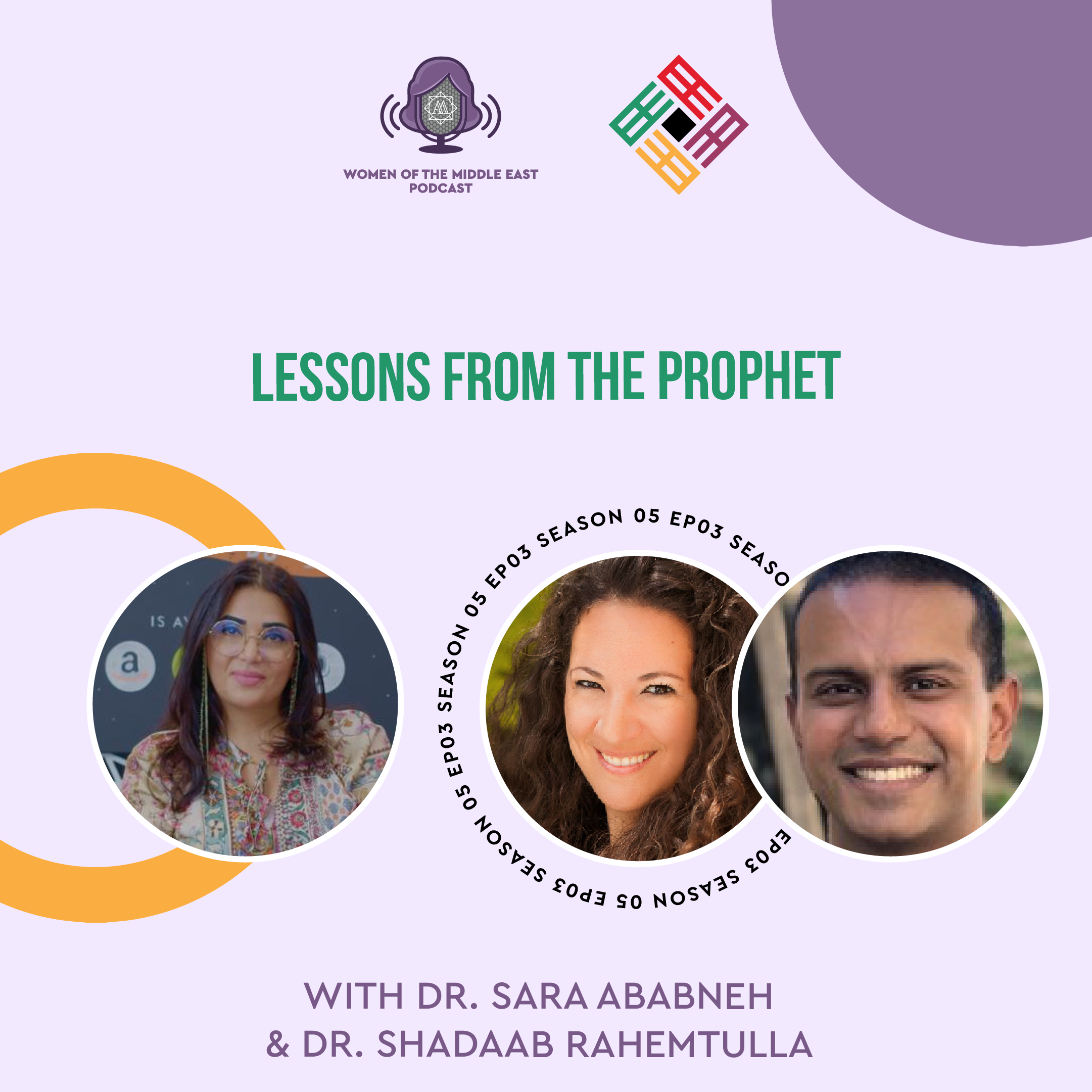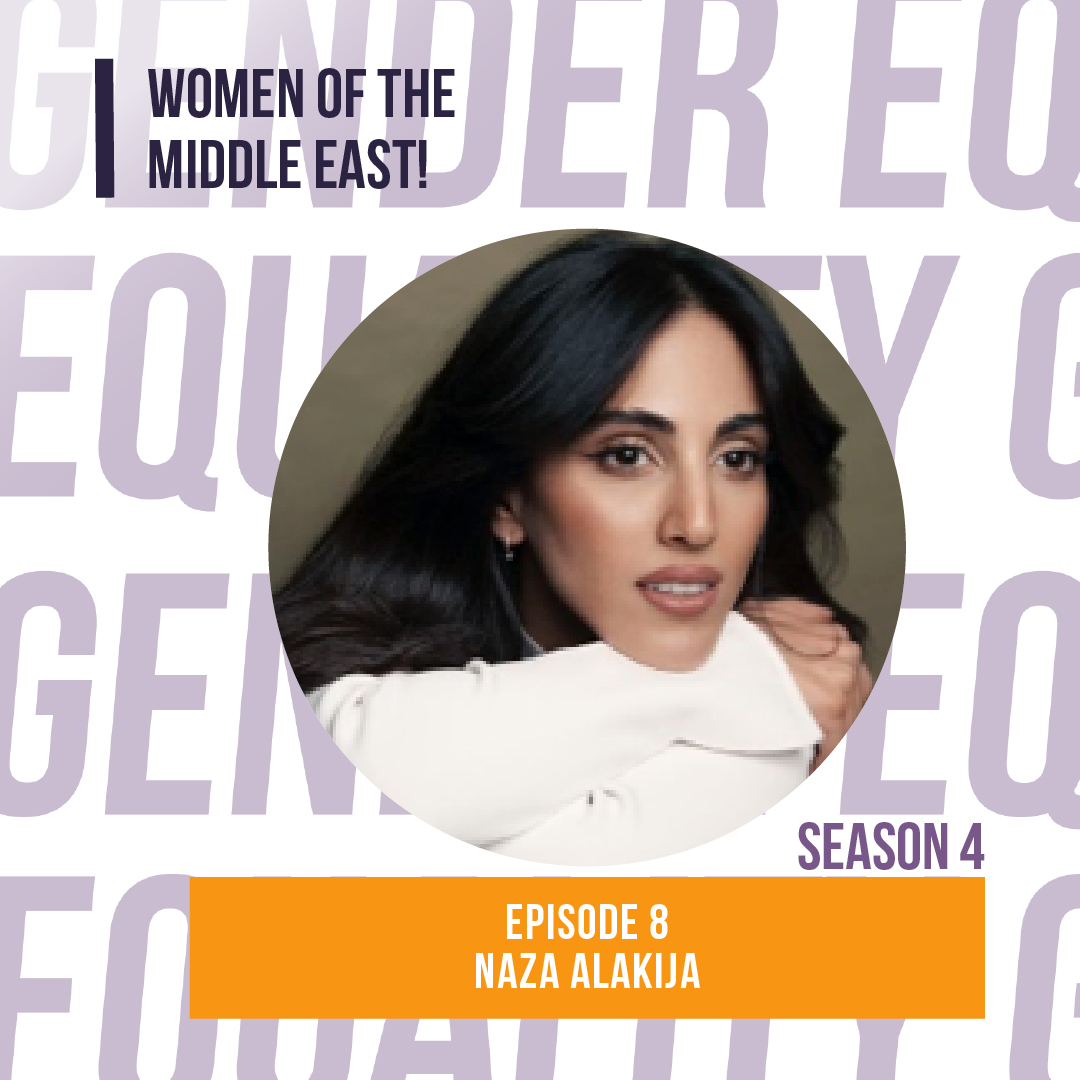Episode Transcript
Speaker 1 00:00:03 Hello and welcome to Women of the Middle East Podcast, women of the Middle East. This podcast relates the realities of Arab woman and their rich and diverse experiences. It's aims to present the multiplicity of their voices and wishes to break overdue cultural stereotypes about women of the Middle East. My name is a Maki. I'm a feminist, scholar and educator.
Speaker 2 00:00:28 This
Speaker 1 00:00:28 Is Women of the Middle East podcast. This is season four woman voices across genres where I will be speaking to women producing feminist content across different genres and outlets. These courageous voices delve into untapped areas such as women with disability, hybrid identities, intergenerational trauma, feminist narrative, and activism, and much, much more. I'm your host, Maki, contributing to creating a new narrative about us by us.
Speaker 2 00:00:56 This is Women of the Middle East, WhatsApp.
Speaker 1 00:00:59 This season was all about creating new narratives about women and Mina by the same woman, the participants of these cultures and socioeconomic and political realities, new general creation through the creation of original content, forming new feminist narratives and innovative ways of communicating these new narratives. Across these nine episodes of Women of the Middle East podcast, we've learned about new genres created by women from different walks of life, each making a mark in an area that is unexplored or underrepresented, and collectively forwarding a new discourse of activism and feminism The 21st century. These are women who are not shy of saying it as it is and are brave to explore and appropriate different communicative modalities to reach and support women in their direct and indirect communities. I've had nine intellectually invigorating discussions with nine exceptional women from Kuwait, Egypt, Oman, Palestine, Lebanon, Morocco, Iran, and Iraq, many of whom hold multiple nationalities or hybrids belonging to different cultures.
Speaker 1 00:02:12 A point I would like to emphasize, the richness of their identities and their sense of commitment to the feminist schools expands and stretches their influence and impact beyond the geographical boundaries of of where they reside. For example, these diverse and hybrid identities are a strength that they embrace and build on even if their societies try to use it against them. They learnt about women's status within their societies and can identify the challenges women faced through the eyes of an anthropologist, but they are also participants in these cultures, the cultures that they observe and study. They combine the local and the global, the inner and the outer worlds. They are also able to see it from inside out, but also from outside in. In this episode, I would like to take you back in a reflective journey over what has been said and what we have learned from these stories we've heard, and what is life, but a story in which agency or lack of plays an important role.
Speaker 1 00:03:13 On this ending, I gather these stories and retell them to you consciously attempting to keep them alive in your memories because believe me, you will find yourself in them no matter where you are. These stories of those strategic role models, not seeking glory, but justice inequality, they're also consciously attempting to pave paths for others to follow through telling us their stories. I look at their stories and mentally organize them thematically as they collectively tell the story of the woman whom we as feminists are fighting for the woman dis symboled, but also the reality. And we start with the body as Dr. She Shimary defines it as the first home and the first sight of activism when she zooms into the body and our agency or lack of over it, and the process of reconciling our relationship with our first home. She speaks of the body as the container of traumas and highlights how the human universal experience of illness can lead to the sense of exile from one's body.
Speaker 1 00:04:17 She also stands on intergenerational trauma and its impact on our physicality. Her feminist illness narrative breaks, taboos and redefines women's relationship with their own body, the female body, and we know as women from this region that the female body is the biggest taboo of all. She also touches on hybrid identities and sense of belonging to one's true self. Her narrative highlights the importance of voice and agency, the voice that needs to be heard and shared in the process of healing, leading to stating the restorative power of woman, friendship and sisterhood. Dr. Sharine <unk> talks about building identity through sexuality. In her book, she brings forward the untold stories of performance intimacy beyond the accepted model of modern narrative on sexuality. Again, woman claim agency over telling their intimate stories. She also digs deep and resurrects historical evidence of more open and diverse narratives on sexuality. Her scholarship and advocacy on intimate and reproductive rights led her to work on the H I V epidemic in the region, attempting to change the narrative around it, which she does actively through a localization and paying much attention to both the changes in language and perceptions and to what health policy makers need to achieve.
Speaker 1 00:05:36 Our speaker then takes us on a journey and to the taki and the importance of mental health. They do that through creating new narratives within the realm of psychology. I spoke to her. Highness C was advocating mental health and trauma healing as both a woman and a psychologist. She touches on gendered health realities. She brings the youth to the narrative as main characters speaks about self-esteem, family's role education, and reclaiming women's power through mental health. Her <unk> creates a new narrative of feeling for women who are mostly in need of it. She works on supporting them and creating new realities for themselves and their families and communities. Through the healing power of drama. She relates stories of women whom through drama therapy, they overcome societal signal, but more reclaim their self-worth and confidence and their abilities. Emphasizing female bonding and power women do to her and her narrative.
Speaker 1 00:06:41 No longer survive but thrive. Our season then takes a turn outward looking at women's activism, feminism, sisterhood, and intersection with the media, sports, digital, severe rights and responsibilities. In my conversation with Honey Algia, we hear firsthand the story of struggle, determination, and triumph of a woman invading a male dominated space. Honey creates a new narrative for woman athletes in the region. Football is not only a public space, but also highly physical. One, it is as she emphasizes a political instrument promoting nonviolence, inclusion and justice. In playing football, she creates spaces of freedom in moving beyond death and destruction to hope and opportunity. A space of feminist activism where she calls for equal rights and opportunities for women and building feminist networks around shared calls, creating a critical collective force working towards change. Another public space is media and narrative evolves from all the media representation to creating new and transformative content on new media.
Speaker 1 00:07:51 In my conversation with Deanna McCullin, she relates her impressive and long experience and traditional media, the challenges she faced, whether structural or cultural, which led her to creating a new digital narrative, utilizing new media platforms, reaching out to a bigger audience while taking full agency over its content and approach. Media's power is incomparable and is highly political, so our conversation covered areas in which women aren't traditionally involved. Politics, legal systems, patriarchy. We shared personal stories about sexism, ageism, and state feminism. Her frustration with traditional media led her to creating digital spaces for feminism and feminist activism. Her pride in being a feminist and speaking about cyber feminism and social media's power and forwarding a new platform for women's voices free from control and censorship. Defying claims that the Arabic language cannot carry feminist dialogues and content because it lacks the concepts and the equivalence of meanings through our revising our feminist narrative when a media personality steps out of the limelight and chooses to turn it to highlight other women.
Speaker 1 00:09:01 Here is a woman who chooses advocacy over fame, or in other words, uses her fame to empower other women. <unk> has gender advocacy to several forms and yielded different results from training and teaching to creating a new media platform focusing on women and sports. In doing so, her advocacy was multifaceted. She addressed the data gap, the women's sports and the region, and presented women's stories, authoring opinion and mentalities within these societies, but also breaking stereotypes about these women outside their societies. Of course, there's also the power of free life role models where girls in the MENA region will learn that they also can make it into sports. Activism is another narrative that women of the Middle East are mastering, expanding the power of agency and influence and altering the power dynamics within their communities and beyond. Na Kija taught us about the importance of contextualizing the support communities need by learning about these communities firsthand.
Speaker 1 00:10:05 As she did. It is all about long-term solutions by tackling the grassroot of problems. Her philanthropy is way different than the white man's aid and philanthropy. As she's aware of the colonial legacy attached to it. She spoke about showing solidarity through giving girls and women the space and education, and through her own efforts of amplifying their voices. We spoke about identity and how it shapes our narrative. We choose who we are in that too. We have an agency. She emphasizes that woman and girls are at the intersection of everything she does from public health to climate justice. We learned from Ed that feminist advocacy is the way to go, turning a victim into a survivor and a survivor and to a leader, and from a leader and to an organizer, and this can happen only if you empower the individuals to tell their own stories and demand their rights and bring about change, and that people of the course are the most deserving within our societies.
Speaker 1 00:11:08 She uses the power of knowledge, which she has obtained after localizing it to better suit the very people. She is set to support and empower. She creates a platform for training and coaching women and men, and to organizing themselves to advocate and campaign. This creates a ripple effect that intends to bring about justice and equality, and moreover, alters the narrative of who holds the power in our societies. Heartfelt thank you to our audience who have been contacting us from all over the world. I hope you enjoyed season four and we've got more in season five. Just remember, follow, subscribe, and write us. This is Women of the Middle East.


